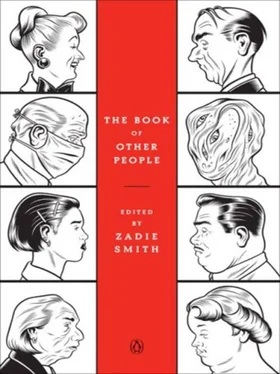These were the names of the men who would have slept with Nigora (thought Nigora), if only she had encouraged them:
Komil
Bakhitiyor.
Then there were the names of men whom Nigora had successfully pursued, but who would not sleep with her again, for various reasons (loyalty to their wives; loyalty to her husband):
Shuhrat
Muhammad.
Next there was the list of men whom Nigora had successfully pursued and who, she thought, would still sleep with her if she wanted to: this list, therefore, could be further and more precisely divided into those whom Nigora would also sleep with, for various reasons (pride; vanity; love) -
Aftandil
Aziz
– and those whom Nigora would not sleep with, for various other reasons (boredom; fidelity; love) -
Khayrullah
Jalol
Abdullah.
And yet this list was complicated by the fact that all these men were absent. They were all in another city, in another country, to which Nigora would never return.
In a cake-shop – in this city which was not her city, this city in the west – Nigora was compiling imaginary lists of her life, while watching the sullen assistant stroke sky-blue ribbon into curlicues with the back of a pair of scissors.
And finally (thought Nigora) there were the men with whom Nigora, in this city, had a chance:
Yaha
Taha
Naguib.
This was the list which mattered to Nigora. Or no. To be more precise: Nigora’s imagination dwelt on those she had not pursued, and those she could still pursue – whether conquered already or not. She only left alone the list of those whom she had conquered and to whom she would no longer return. She was haunted by the spectre of non-fulfilment.
But one name was more present than the rest.
Yaha .
It would also be possible to describe Nigora’s life in a list of all the films which she had seen with her father, on Kultura or the more commercial Russian channels, from the age of six to sixteen. Each Saturday afternoon, they would settle down in the living room, thus avoiding the tantrums and depression of her mother, his wife.
On their satellite television, they watched varieties of romantic comedy, both ancient and modern:
The Lady Eve
The Philadelphia Story
Sullivan’s Travels
When Harry Met Sally
Roman Holiday .
They watched teen movies:
Pretty in Pink
The Breakfast Club .
They watched weepies ( An Affair to Remember ) and screwball comedies ( Bringing Up Baby ). They admired the oeuvre of Preston Sturges – the unacknowledged genius of the American 1940s. They watched the Russian mini-series of Sherlock Holmes, with the great Vasily Livanov (Holmes) and Vitaly Solomin (Watson). They made forays into the artistic and silver world of Max Ophuls
( Le Plaisir
La Ronde
Madame de )
and the artistic and silver world of Jean Renoir
( La Règle du jeu
La Grande illusion
Toni ).
They treasured André Hunebelle’s films of Fantômas, the sadistic master criminal of Paris – who owned a Citroën DS with retractable wings. Nigora’s favourite, disputed by her father, was Fantômas contre Scotland Yard . Her father preferred the simplicity of Fantômas . They watched Truffaut ( Le Dernier métro ) and Godard (Le Mépris ). But most of all they watched the American 1970s:
Coppola
Scorsese
Peckinpah
Lumet
Kubrick
Polanski.
Like the list of Nigora’s love affairs, perhaps this list is also overly comprehensive. For what predominated, from the weekends of her childhood, was not the films. The films were exorbitant; what remained was a sense of sadness and of loss.
Her mother would stop talking to her and her father for two weeks. She would refuse to address her daughter in front of the mothers at her school. She worked two jobs – one as a lecturer in the university, in classical archaeology, the other as a reader for a specialist ancient history publisher. And these jobs, she would remind her daughter, made her tired. They exhausted her, she said.
Nigora, as a girl, always identified with the minor characters. She always sympathised with the rejected, the marginalised, the small.
In the cake-shop, balancing a cake-box on the tripod of her fingers – like a waiter – Nigora made lists of her life. She remembered the sledge on nails above the front door; the dovecote of slippers beside it. She remembered doing piano practice on a Saturday morning, a metronome becoming hysterical beside her.
In the Maison Thomas pizzeria ( Le Caire, fondée en 1922, Open 24 hours ), Yaha began to write a letter to an older woman. It was the fourth of a collection that would eventually comprise seventeen letters. In this letter – which bore an unnoticed tear of chilli sauce – he would write the sentence: ‘Whenever I imagine a future I imagine it with you.’ And Nigora, reading this, would be touched, and would not believe him.
Simultaneously, Nigora’s husband – Laziz – arranged his elbow in a scalene triangle, pleasantly uncomfortable, on the rim of the perpetually open driver’s window. His car was imported from the Communist past of Eastern Europe: it was yellow and outdated. Its window-frames contained no glass whatsoever.
Its meter was printed in Cyrillic, with TAKCИ.
Laziz sat in the traffic and looked at the smog on the river. Like Nigora, his thoughts were nostalgic. Unlike Nigora’s, they were also romantic. Lazizjon , he was thinking. Lazizjon .
Oh my Laziz.
A dubbed and imported video of The Philadelphia Story – a present for their anniversary – lay clipped inside a clouded plastic box, on the passenger seat beside him. The passenger seat and its headrest were shrouded in the costume of a panda.
Laziz believed in two things. He believed in tribulation. The history of the world was a history of pain. But Laziz did not worry about this world. Its pain did not distress him. Neither loss nor death distressed him. For he also believed in God, and His inscrutable gifts.
He picked a cassette, titled in red felt-tip, from a pile beside the gear-stick, and blew into each spoked wheel before slotting it happily into its slit. After several uncertain and anxious seconds, the voice of Natacha Atlas began to be husky in his car.
Laziz (thought Laziz) was happy. He was a married man. Nothing, therefore, could harm him. He was protected by the love of God, and its earthly counterpart, the love of his wife.
He knew that when he died he would hear a voice, and that voice would greet him by his name.
In Namangan, the city where he was born, and where he had assumed that he would die (but he would not), Laziz had begun a bakery business. He started a chain of shops selling cake, flowers – gladioli in translucent plastic, like a wedding dress – and boxes of outdated chocolate. He had started it in 1989, when everyone believed in perestroika , for the West and for the East.
In Namangan, Laziz’s sexual encounters had been limited to occasional kisses, occasional fumblings. He would listen with careful unconcern to the stories of his colleagues, his employees – about their wives and their affairs. None of Laziz’s affairs were affairs of the heart .
As he sat each night in his only armchair, with its pornographic rents and tears, as he read business textbooks in Russian, Laziz used to console himself with the theory that this prolonged virginity was not, as some might argue, due to weakness, or fear. It was instead due to a care for the female; it was a superhuman tenderness. He was a superhero of tenderness.
Читать дальше












